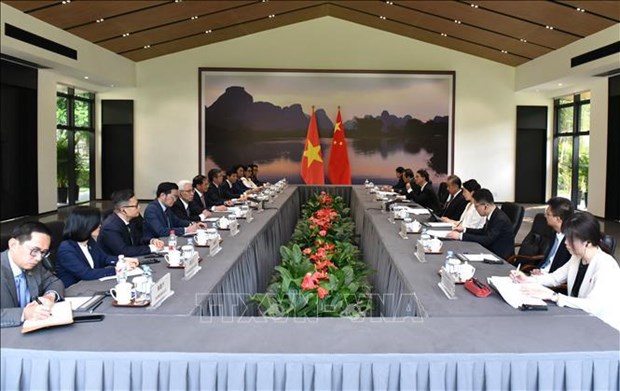 Politics & Law
Politics & Law

 |
| The talks between the Vietnamese and Chinese foreign ministers in Guangxi province on April 4. — VNA/VNS Photo |
BEIJING — Minister of Foreign Affairs Bùi Thanh Sơn held talks with Wang Yi, member of the Politburo of the Communist Party of China (CPC) Central Committee, Director of the Office of the CPC Central Committee’s Commission for Foreign Affairs and Minister of Foreign Affairs of China, in Guangxi province on April 4.
The event, part of Minister Sơn’s official visit to China, was the first meeting between the two foreign ministers since their countries agreed to elevate the comprehensive strategic cooperative partnership and build a community with a shared future that carries strategic significance.
The ministers held that since the historic visits by Vietnamese Party General Secretary Nguyễn Phú Trọng to China in October 2022 and by Party General Secretary and President of China Xi Jinping to Việt Nam in December 2023, bilateral relations have developed strongly and obtained important results. Particularly, the two sides’ senior leaders agreed to identify a new status for the countries’ relations, and issued a joint statement on continuing to deepen and elevate the comprehensive strategic cooperative partnership and build a community with a shared future that carries strategic significance.
Sơn and Wang affirmed the leading importance of the Việt Nam - China relations in each country’s foreign policy, stressing the need to enhance coordination and effectively carry out the high-level agreements and common perceptions so as to unceasingly develop bilateral ties in a healthy, stable, and sustainable manner.
They agreed to maintain frequent high-level exchanges and meetings, reinforce cooperation between the two Parties, and work together to properly organise high-level diplomatic activities between the two countries in 2024, the 16th meeting of the Steering Committee for Bilateral Cooperation, along with dialogue, exchange, and cooperation mechanisms in the fields of defence - security and justice.
The officials also agreed to foster and improve the effectiveness of economic and trade partnerships, with priority given to promoting strategic transport connectivity, facilitating socio-economic exchanges, and contributing to China’s cooperation with Southeast Asia.
They concurred in increasing people-to-people exchanges, boosting communications about the countries’ traditional friendship as well as each country’s achievements in reform and opening, and stepping up exchange and cooperation mechanisms between Vietnamese and Chinese localities.
Việt Nam and China will keep strengthening coordination and mutual support within multilateral frameworks, continue working closely with each other in land border management and protection in line with the three legal documents on land border and related agreements; actively open, upgrade, and recognise pairs of border gates; and accelerate the building of smart border gates, they noted.
With regard to sea-related issues, the two sides underlined the importance of seriously implementing the agreements and common perceptions reached between the two Parties and countries’ leaders on properly controlling and settling differences; fully, comprehensively, and effectively implementing the Declaration on the Conduct of Parties in the East Sea (DOC); and joining ASEAN countries in promoting negotiations and soon finalising a substantive, efficient, and effective code of conduct (COC) in the waters that matches international law and the 1982 United Nations Convention on the Law of the Sea (UNCLOS).
Minister Sơn asked both sides to bolster balanced and sustainable economic - trade cooperation.
He called on China to continue facilitating and increasing the import of Việt Nam’s agricultural products, create conditions for early establishing some trade promotion offices of Việt Nam in Chinese localities, and actively tackle problems of some industrial cooperation projects. He also proposed China speed up railway connection with northern Vietnamese provinces, expand economic corridors in the “Two Corridors, One Belt” region to Chongqing of China, soon set up a working group for tourism promotion, increase commercial flights, and further boost people-to-people ties as well as exchanges between border localities of the countries.
For his part, Wang asked the two sides to foster the strategic connectivity between the “Belt and Road” Initiative with the “Two Corridors, One Belt” framework, and tighten economic, trade and investment links.
China will actively consider expanding the import of goods, farm produce, and aquatic products from Việt Nam, he said, noting that it supports road transport connectivity and the building of smart border gates to facilitate customs clearance; supports stronger educational and tourism ties. The country will coordinate more closely with Việt Nam at regional and international multilateral forums, he added.
Also on April 4, Minister Sơn examined the pilot operation of the landscape site of Bản Giốc (Việt Nam) - Detian (China) Waterfalls. — VNS




